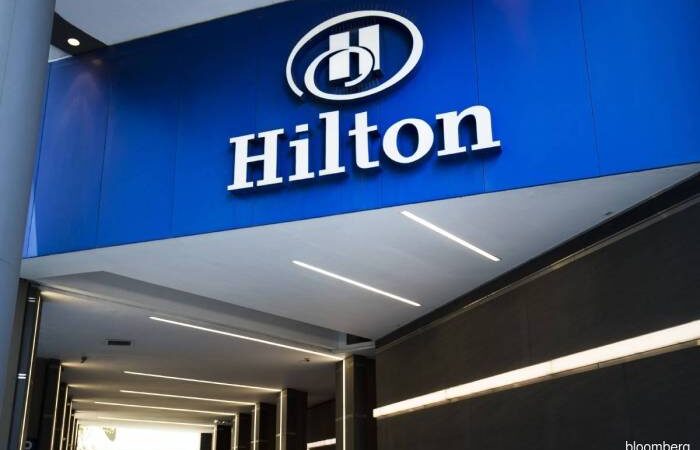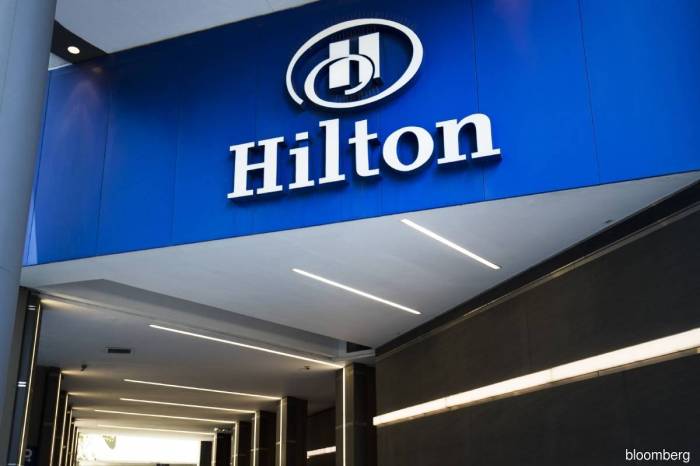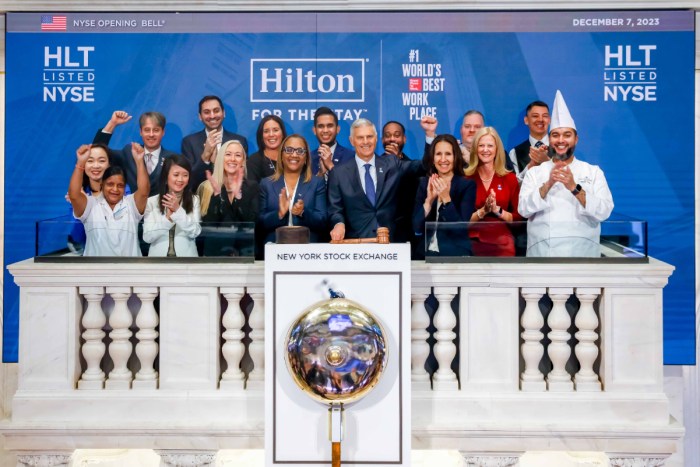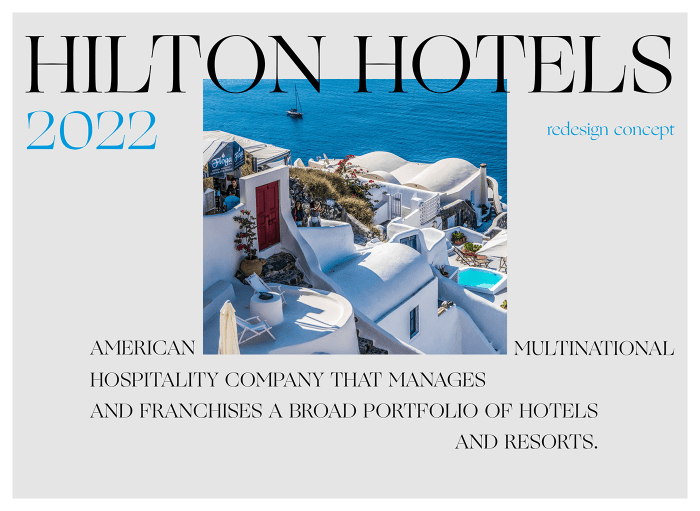Hilton Corporate Booking Streamlining Your Travel

Hilton corporate booking simplifies business travel. This guide walks you through the process, from finding the best rates to managing your bookings efficiently. We’ll cover various booking methods, the benefits of the Hilton Honors corporate program, and smart negotiation strategies to save your company money. Get ready to optimize your corporate travel experience!
We’ll explore the different booking channels available – online portals, travel agents, and direct contact – weighing their pros and cons to help you choose the best fit for your company’s needs. We’ll also delve into the powerful tools and technology Hilton offers to make managing large volumes of bookings a breeze.
Hilton Corporate Booking Process
Booking a Hilton hotel for your company’s travel needs is straightforward, offering various options to suit your preferences and workflow. This process ensures efficiency and often provides access to discounted rates and other corporate benefits. Let’s explore the steps and choices available.
Hilton Corporate Booking Channels
Corporations can book Hilton accommodations through several channels, each with its strengths and weaknesses. Understanding these differences helps optimize the booking process for your company.
| Booking Channel | Advantages | Disadvantages |
|---|---|---|
| Online Corporate Portal | Convenience, 24/7 access, often pre-negotiated rates, and easy tracking of bookings. | Requires initial setup and account management, and may lack personalized service. |
| Travel Management Company (TMC) | Centralized booking management, negotiated rates, expert travel advice, and consolidated billing. | Potential higher fees, less control over individual bookings, and dependency on TMC’s availability. |
| Direct Contact with Hilton | Personalized service, ability to negotiate rates directly, potential for special arrangements. | Can be time-consuming, and may not always offer the best rates without prior negotiations. |
Steps in a Typical Hilton Corporate Booking
The booking process generally follows a similar pattern regardless of the chosen channel.
| Step | Description |
|---|---|
| 1. Request Initiation | A travel request is initiated, either by an employee, a department, or through a TMC. This includes details like dates, location, number of guests, and any special requirements. |
| 2. Availability Check | The chosen booking channel checks availability at the desired Hilton property. This may involve searching across multiple properties if needed. |
| 3. Rate Negotiation (if applicable) | Depending on the booking volume and pre-existing agreements, rate negotiation may occur. This is more common with direct bookings or through TMCs. |
| 4. Booking Confirmation | Once the details are finalized, a booking confirmation is issued, including the booking reference number, guest details, and payment information. |
| 5. Pre-arrival Communication (Optional) | Some Hilton properties offer pre-arrival communication to confirm details and answer any questions. |
| 6. Check-in/Check-out | The standard check-in and check-out procedures are followed at the hotel. |
Hilton Corporate Booking Process Flowchart
The following table visually represents the typical flow of a Hilton corporate booking. Imagine each row as a step in a vertical flowchart.
| Step | Action | Decision Point | Outcome |
|---|---|---|---|
| 1 | Booking Request Submitted | Is the request valid? | Valid Request/Invalid Request |
| 2 | Availability Check | Is the requested room available? | Available/Unavailable |
| 3 | Rate Confirmation | Is the rate acceptable? | Accepted/Rejected |
| 4 | Booking Confirmation | Booking confirmed? | Confirmation Sent/Booking Cancelled |
Hilton Honors Corporate Program Benefits

Source: theedgemarkets.com
Unlocking significant cost savings and enhanced travel experiences for your employees is a key goal for any business. The Hilton Honors Corporate Program offers a range of benefits designed to achieve just that, streamlining your travel management and maximizing your return on investment. These benefits extend beyond simple discounts, offering a comprehensive solution to optimize your company’s travel budget and improve employee satisfaction.
The Hilton Honors Corporate Program provides a centralized platform for managing your company’s travel, offering significant advantages over booking individual stays. This includes simplified billing and reporting, allowing for better budget control and easier expense tracking. The program also integrates seamlessly with many existing travel management systems, reducing administrative overhead and improving efficiency.
Cost-Saving Strategies Through the Hilton Honors Corporate Program
Participating in the Hilton Honors Corporate Program opens doors to several cost-saving opportunities. These strategies are designed to reduce your overall travel expenses while ensuring your employees maintain a comfortable and productive travel experience.
- Negotiated Rates: Secure significantly discounted rates at participating Hilton properties worldwide, often surpassing those available through online travel agencies or individual bookings.
- Volume-Based Discounts: Benefit from tiered discounts based on your company’s total spending, leading to greater savings as your travel volume increases. For example, a company booking 1000 room nights annually might receive a 15% discount, whereas a company booking 5000 room nights could receive a 20% or even higher discount.
- Simplified Billing and Reporting: Centralized billing simplifies expense tracking and reconciliation, minimizing administrative time and reducing potential errors. This streamlined process allows for easier budget management and improved financial visibility.
- Points Redemption for Corporate Travel: Earn Hilton Honors points on all corporate bookings, which can then be redeemed for future travel expenses, effectively reducing the overall cost of your travel program.
Comparison with Competitor Corporate Programs
While Marriott Bonvoy, Hyatt Global Account Program, and other hotel loyalty programs offer similar corporate benefits, Hilton’s program stands out in several key aspects. A direct comparison reveals nuanced differences that impact overall value and convenience.
Feature Hilton Honors Marriott Bonvoy Hyatt Global Account Negotiated Rates Highly competitive, often exceeding OTA rates Competitive, varies by property and volume Competitive, focuses on specific corporate needs Volume-Based Discounts Clearly defined tiers, easily accessible Often negotiated individually, less transparent Similar to Hilton, with tiered discounts Program Features Strong emphasis on points redemption and streamlined billing Robust rewards program, strong focus on luxury properties Focuses on personalized service and customized solutions Global Reach Extensive global presence, covering a wide range of properties Similar extensive global reach Strong presence in key business markets
Negotiating Corporate Rates with Hilton
Securing favorable corporate rates with Hilton involves a strategic negotiation process. Understanding the key factors and employing effective strategies can significantly impact the final agreement and your company’s overall travel budget. This section Articulates the typical negotiation process, key influencing factors, and strategies for maximizing your negotiating power.
The Hilton Corporate Rate Negotiation Process
Typically, the negotiation begins with an initial contact between your company’s designated travel manager or procurement team and a Hilton sales representative. This initial contact involves presenting your company’s needs, including estimated annual room nights, desired locations, preferred amenities, and desired rate range. Hilton will then assess your company’s profile and potential volume to determine a preliminary rate offer. This offer will be based on factors like the seasonality of your travel needs, the specific Hilton properties you’re targeting, and the overall demand at those locations. Subsequent rounds of negotiation may involve discussions around specific contract terms, such as cancellation policies and guaranteed room blocks. The process culminates in a mutually agreeable contract outlining the corporate rate, terms, and conditions.
Factors Influencing the Negotiation
Several key factors significantly influence the negotiation process and the resulting corporate rate. High-volume bookings, for example, provide significant leverage, allowing for more favorable rates and potentially additional benefits. The length of the contract is another crucial factor; longer contracts generally result in lower rates due to the guaranteed revenue stream they offer Hilton. The specific Hilton properties involved also play a role, with high-demand locations often commanding higher rates. Finally, the overall market conditions and competitive landscape influence the negotiation, as Hilton will adjust its pricing based on demand and competitor offerings in the area.
Strategies for Maximizing Negotiating Power
Corporations can leverage several strategies to maximize their negotiating power. One effective strategy is to consolidate bookings with a single hotel chain, such as Hilton, to increase negotiating leverage based on volume. Another is to clearly articulate the value your company brings to Hilton, highlighting factors like consistent occupancy and strong brand alignment. Thorough research of competitor offerings and market rates allows for a more informed negotiation. Finally, demonstrating flexibility in terms of dates and locations can sometimes lead to better rates, as it allows Hilton to better manage its inventory.
Comparison of Negotiation Tactics and Outcomes
| Negotiation Tactic | Potential Outcome | Advantages | Disadvantages |
|---|---|---|---|
| High-volume booking commitment | Significantly lower rates, potential for added benefits (e.g., upgrades, complimentary services) | Strong leverage, improved ROI | Requires accurate forecasting of travel needs |
| Longer-term contract | Lower rates due to guaranteed revenue for Hilton | Predictable costs, cost savings over time | Less flexibility for future adjustments |
| Flexibility in dates and locations | Potentially better rates by filling Hilton’s less-demanding periods | Increased chances of securing better rates | May require adjustments to travel plans |
| Demonstrating brand alignment | Potential for preferential treatment and improved relationships | Stronger partnership, potential for future benefits | Requires demonstrating genuine brand synergy |
Managing Hilton Corporate Bookings

Source: smallmarketmeetings.com
Efficiently managing a large volume of Hilton corporate bookings requires a strategic approach that leverages technology and establishes clear processes. This ensures cost control, compliance, and a positive experience for travelers. Successful management hinges on utilizing the right tools and implementing robust record-keeping and reporting systems.
Effective management of Hilton corporate bookings relies heavily on utilizing available tools and implementing robust processes. This section details strategies for optimizing booking management and maintaining accurate records.
Hilton’s Online Booking Tools
Hilton offers various online tools designed to streamline the booking process for corporate clients. These tools often include centralized booking portals allowing employees to easily search for and reserve rooms, corporate rate management systems for tracking negotiated rates and reporting dashboards providing visibility into booking data and spending. Utilizing these features reduces manual effort, minimizes errors, and improves overall efficiency. For instance, the ability to pre-load employee travel profiles with preferences and payment information significantly accelerates the booking process.
Accurate Record-Keeping and Reporting in Corporate Travel Management
Maintaining meticulous records of all corporate bookings is crucial for several reasons. It enables accurate expense tracking, facilitates budget monitoring, aids in identifying cost-saving opportunities, and ensures compliance with company travel policies. Comprehensive reporting allows for data-driven decision-making, enabling the company to negotiate better rates, optimize travel strategies, and improve overall cost-effectiveness. For example, regular reports on average daily rates (ADR) across different locations can inform negotiations for future contracts.
Best Practices for Tracking Expenses and Ensuring Compliance
Several best practices contribute to effective expense tracking and policy compliance. These include integrating booking systems with expense management software, implementing clear expense reporting procedures, and regularly auditing travel expenses against company policies. Automated expense reporting tools can significantly reduce manual data entry and the risk of errors. Regular reviews of travel policies ensure they remain relevant and effective in controlling costs and promoting compliance. For example, a company might establish a policy limiting the choice of hotel to a specific tier based on the trip’s purpose, thereby controlling expenditure.
Sample Report: Hilton Corporate Booking Summary
A well-structured report provides a clear overview of key booking metrics. Below is an example of a summary report that could be generated using data from Hilton’s online booking tools.
| Metric | January | February | March |
|---|---|---|---|
| Total Bookings | 150 | 180 | 200 |
| Total Spend ($) | 50,000 | 60,000 | 70,000 |
| Average Daily Rate ($) | 150 | 160 | 175 |
| Average Length of Stay (days) | 2.5 | 2.8 | 3.0 |
| Occupancy Rate (%) | 80 | 85 | 90 |
Hilton Corporate Booking Technology

Source: skift.com
Hilton’s corporate booking technology aims to streamline the process for businesses of all sizes, from small startups to multinational corporations. It leverages a suite of online tools and mobile applications designed for efficiency and a user-friendly experience, aiming to reduce the administrative burden associated with travel management. This technology integrates seamlessly with many corporate travel management systems (CTMs), further enhancing its value.
Hilton’s technology significantly enhances efficiency and improves the booking experience by centralizing the booking process. This means corporate travel managers can easily access and manage all their company’s bookings in one place, reducing the time spent searching across multiple platforms. Real-time availability and pricing updates ensure accurate information, eliminating the guesswork and potential for errors. The integrated reporting features allow for easy tracking of spending and compliance with corporate travel policies. Furthermore, the mobile app provides on-the-go access to bookings and the ability to make changes or cancel reservations quickly and easily.
Hilton’s Online Booking Tools
Hilton’s online booking portal provides a centralized platform for managing corporate travel. Key features include bulk booking capabilities, allowing for the simultaneous reservation of multiple rooms for groups or events. The platform also integrates with corporate travel policies, ensuring that bookings comply with company guidelines. Automated reporting tools track spending and provide valuable insights into travel patterns. The user interface is designed to be intuitive and easy to navigate, minimizing the learning curve for users. Customizable dashboards allow for personalized views of key metrics.
Hilton’s Mobile Application
The Hilton Honors mobile app offers corporate travelers a convenient way to manage their bookings on the go. Features include the ability to check in and out remotely, access room keys digitally, and make changes to existing reservations. The app also provides real-time updates on flight information and integrates with ride-sharing services for seamless transportation to and from the hotel. Push notifications alert users of important updates or changes to their itinerary. The app’s intuitive design makes it easy to use, even for infrequent travelers.
Comparison with Other Hotel Chains
While many hotel chains offer online booking tools and mobile applications, Hilton’s platform distinguishes itself through its robust features and seamless integration with corporate travel management systems. Features such as bulk booking, customized reporting, and policy compliance are often more limited or less user-friendly in competing platforms. The level of integration with other travel services, such as flight tracking and ride-sharing, also sets Hilton apart. While a direct comparison requires a detailed analysis of each competitor’s offering, Hilton’s technology consistently receives positive feedback for its ease of use and comprehensive functionality.
Scenario: Streamlined Corporate Travel with Hilton Technology
Imagine Sarah, a project manager at a tech startup, needing to book accommodations for her team of five for a week-long conference in San Francisco. Using Hilton’s corporate booking portal, Sarah accesses the platform, selects the desired dates and locations, and specifies the number of rooms needed. The system automatically searches for available rooms within the company’s pre-approved hotels, showing pricing and availability in real time. She selects the appropriate rooms, adhering to the company’s travel policy that specifies a maximum spending limit per night. The platform confirms the bookings instantly, sending individual confirmations to each team member via email. Before the conference, Sarah uses the reporting tools to track spending and ensure everything remains within budget. During the trip, her team members use the mobile app to access their room keys, check-in seamlessly, and receive notifications about airport shuttles. After the conference, Sarah generates a detailed report for expense reconciliation, highlighting the efficiency and ease provided by Hilton’s technology. This streamlined process saves Sarah significant time and effort, allowing her to focus on her core responsibilities instead of managing travel logistics.
Hilton’s Corporate Sustainability Initiatives

Source: behance.net
Hilton is deeply committed to environmental sustainability and social responsibility, recognizing the crucial role the hospitality industry plays in protecting our planet and supporting communities. Their sustainability initiatives aren’t just about reducing their environmental footprint; they aim to create a positive impact on the world, making sustainable travel a more accessible and appealing option for businesses and individuals alike. This commitment extends to working with corporate partners to achieve shared sustainability goals.
Hilton’s corporate social responsibility programs related to sustainable travel focus on reducing carbon emissions, conserving water and energy, sourcing responsibly, and supporting local communities. These initiatives are integral to their overall business strategy and are actively pursued across their global portfolio of hotels.
Hilton’s Travel with Purpose Initiatives
Hilton’s “Travel with Purpose” initiative is a comprehensive strategy that guides its sustainability efforts. It aims for ambitious goals across various areas, including reducing their carbon footprint by 61% by 2030 and achieving net-zero carbon emissions by 2050. This involves initiatives like transitioning to renewable energy sources, improving energy efficiency in their buildings, and reducing water consumption through technological advancements and operational changes. They also focus on responsible sourcing of food and amenities, supporting local communities through partnerships and job creation, and promoting diversity and inclusion within their workforce.
Corporate Contribution to Hilton’s Sustainability Efforts
Corporations can significantly contribute to Hilton’s sustainability efforts by making conscious choices when booking travel. Choosing hotels that prioritize sustainability, such as those participating in Hilton’s LightStay program (a comprehensive environmental and social responsibility measurement system), directly supports their efforts. Opting for carbon offsetting programs offered by Hilton or other travel providers further minimizes the environmental impact of business trips. Additionally, encouraging employees to participate in sustainable practices during their travels, such as reducing waste and conserving water, amplifies the collective impact.
Impact on the Corporate Travel Sector, Hilton corporate booking
Hilton’s sustainability initiatives are having a noticeable impact on the corporate travel sector. More and more corporations are prioritizing sustainable travel options, recognizing the positive image it projects and the potential cost savings associated with reduced energy and water consumption. This growing demand is driving innovation within the industry, encouraging other hotels and travel providers to adopt more sustainable practices. The increased transparency and reporting of sustainability performance, facilitated by initiatives like LightStay, allow corporations to make informed decisions and track the environmental and social impact of their travel spend.
Visual Representation of a Sustainable Travel Initiative
Imagine a vibrant rooftop garden atop a Hilton hotel, teeming with herbs and vegetables used in the hotel’s restaurant. This garden, irrigated with recycled greywater, provides fresh, locally sourced produce, reducing food miles and supporting local farmers. Solar panels integrated into the rooftop structure generate renewable energy, offsetting the hotel’s reliance on fossil fuels. The garden also serves as a community space, hosting workshops on sustainable gardening and providing educational opportunities for local school children. This initiative reduces the hotel’s carbon footprint, conserves water, supports local agriculture, and fosters community engagement, showcasing a holistic approach to sustainable hospitality.
Last Point
Mastering Hilton corporate booking is key to efficient and cost-effective business travel. By understanding the process, leveraging the Hilton Honors program, and employing effective negotiation strategies, your company can significantly reduce travel expenses and improve employee satisfaction. Remember to utilize the available technology and prioritize sustainable travel options to maximize the benefits.
FAQ Resource
Can I combine personal and corporate bookings under one Hilton Honors account?
Generally, yes, but you’ll need to ensure you’re booking under the correct profile (personal or corporate) to receive appropriate points and benefits.
What happens if my corporate travel dates change?
Contact your company’s travel administrator or Hilton directly as soon as possible to modify your reservation. Cancellation policies will apply depending on your booking type and the hotel’s policies.
Are there any restrictions on room upgrades using corporate rates?
Room upgrade availability and restrictions vary based on the negotiated corporate rate and hotel occupancy. Check with your travel administrator or the hotel directly for details.
How can I access past corporate booking invoices?
Your company’s travel management system should provide access to booking details and invoices. If you’re unable to locate them there, contact your travel administrator or Hilton for assistance.
What if I need to make changes to a group booking?
Contact the hotel directly or your designated group contact to discuss changes. Significant changes may involve fees or adjustments to your group rate.
Comments are closed.